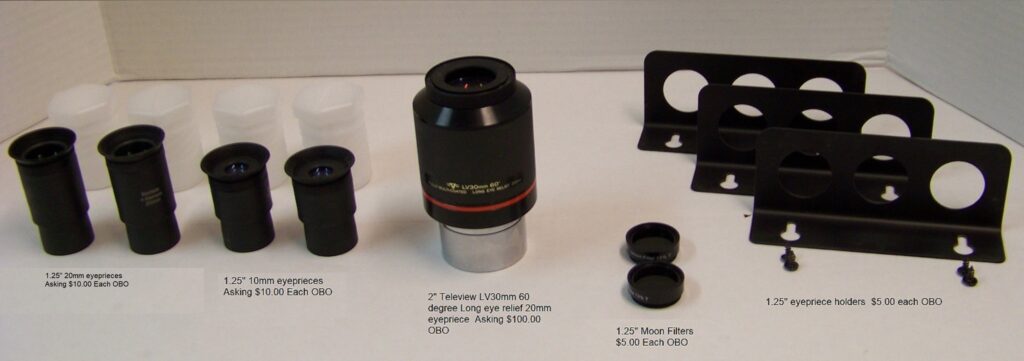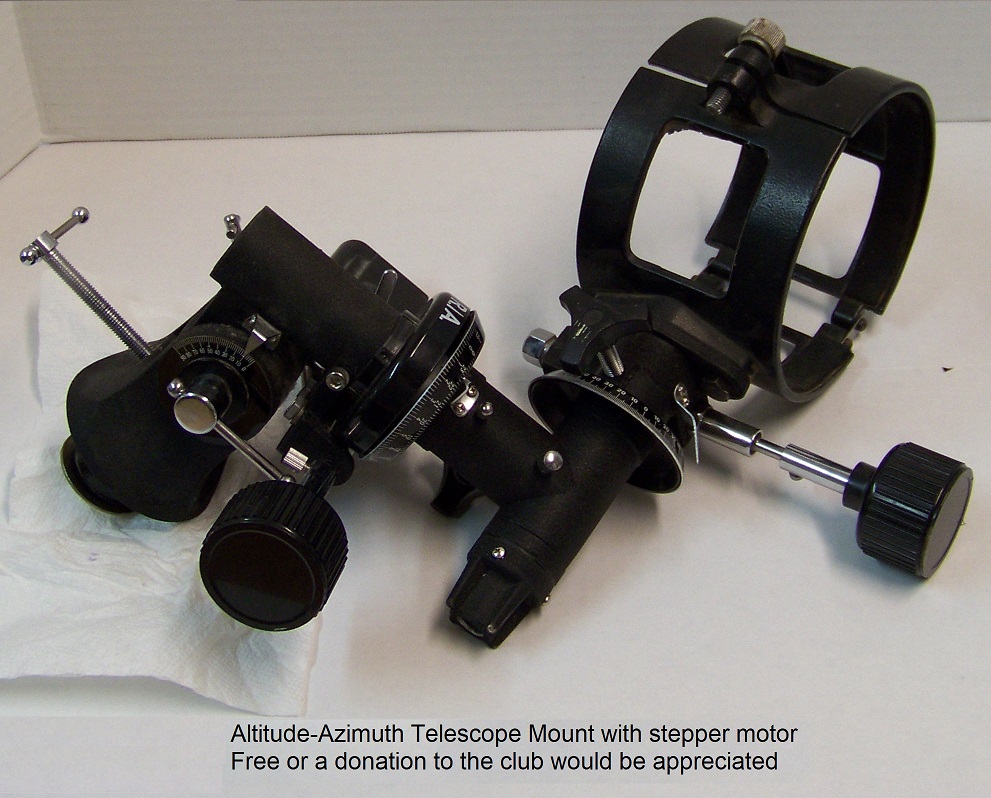You must checkout this fantastic Dobsonian telescope, great for back yard astronomy.

You must checkout this fantastic Dobsonian telescope, great for back yard astronomy.

1.25″ 20mm Bertale eyepieces $10.00 each OBO
1.25″ 10mm Bertale eyepieces $10.00 each OBO
2 inch LV30mm 60 degree long eye relief 20mm $100.00 OBO
1.25″ Moon Filters $5.00 Each OBO
1.25″ Eyepiece holders $5.00 each OBO

Altitude-Azimuth Telescope Mount with stepper motor
Free or a donation to the club would be appreciated

WVAC members may list astronomy items for sale here. To submit a “FOR-SALE” notice, please send us a message. In your email message, please provide details of the item(s) for sale, your asking price(s), condition, and location of the item(s), your name and contact information, etc. You may also attach any images of the item(s) to be included in the advertisement. Please let us know when the item(s) is no longer available, so it may be removed from this list.
Here are a number of links to interesting astronomy websites.
Night Sky Network!
Get it all here… the clubs in your area, night sky planner, moon phase, and outreach resources
JPL & NASA Photo Journal
Excellent site to fine photos from the space program.
Ronald Greeley Center for Planetary Studies
This link will take you directly to the downloadable poster page, there is a lot more to explore on this website.
The Weather Channel
Check out the current weather conditions for the Phoenix area
Arizona State Parks – Star Parties & Astro Events
Astronomy events right here in our own Arizona state parks
NASA New Horizon Mission
This exciting mission launched in January 2006 and is enroute to Pluto and the Kuiper Belt. It is the fastest spacecraft and arrived at Pluto in July 2015 where it flies by this mysterious, frozen world and its moon Charon. The mission has already discovered two new moons around Pluto and many more discoveries are in store.
International Dark Sky Association
The International Dark-Sky Association is the only non-profit organization fighting to preserve the night, working to protect wildlife, cut energy waste, and stop light pollution.
The Fred Lawrence Whipple Observatory (FLWO) is the largest satellite facility of the Smithsonian Astrophysical Observatory (SAO), part of the Harvard & Smithsonian Center for Astrophysics. Located on Mt. Hopkins in southern Arizona, this remote site is home to a number of telescopes, including the 6.5 meter MMT Observatory. The observatory also includes the Very Energetic Radiation Imaging Telescope Array System (VERITAS) gamma-ray observatory, telescope arrays designed to find Earth-like exoplanets, and a number of other telescopes used for a wide range of astronomical observations. Location: 670 Mt Hopkins Rd, Amado, AZ 85645
Lowell Observatory is an independent, non-profit research institution founded in 1894 by mathematician and astronomer Percival Lowell. Today, their mission is to pursue the study of astronomy, conduct research, and bring astronomical education to the public. Location: 1400 W Mars Hill Rd, Flagstaff, AZ 86001
The Large Binocular Telescope Observatory (LBTO) is located in southeastern Arizona near Safford in the Pinaleno Mountains on Emerald Peak at an altitude of 3200m. LBT is a pair of 8-m class telescopes working together as well as the first of the ELTs (Extremely Large Telescopes), able to provide the spatial resolution of a 22.7m telescope. LBTO is headquartered on the Tucson campus of the University of Arizona and is an international collaboration of several Universities and research institutes. The scientific interests of the LBTO partnership span the full range of modern astrophysics. Location: 12500 W Swift Trail, AZ-366, Safford, AZ 85546
Kitt Peak National Observatory (KPNO) is a Program of the NOIRLab. NSF’s NOIRLab is the US national center for ground-based, nighttime optical and infrared astronomy. The Association of Universities for Research in Astronomy, Inc. (AURA) operates these facilities and NSF’s NOIRLab under a cooperative agreement with the National Science Foundation (NSF). KPNO hosts the facilities of consortia that, between them, operate more than a dozen optical telescopes and two radio telescopes. Established in 1964 and in its sixth decade of operations, the Kitt Peak Visitor Center has been enjoyed by more than two million people. Guests experience the largest and most diverse collection of research telescopes in any one place in the world. Three of the nearly two dozen active telescopes on Kitt Peak are dedicated solely to public viewing in the world-renowned nightly stargazing programs. Location: Kitt Peak National Observatory, Tucson, AZ 85634, AZ 85635, United States
The Mount Lemmon SkyCenter seeks to offer premium educational and public outreach experiences in science and astronomy. It is located at Steward Observatory’s “sky island” observing site just north of Tucson, Arizona. The SkyCenter builds upon the uniqueness of the 9,157 feet summit of Mt. Lemmon and on the extensive knowledge base at the University of Arizona to deliver educational adventures including: 1. SkyNights – A night-time observing program that provides the opportunity to peer beyond the blue horizons of our southwestern skies, and 2. Astronomer Nights – This opens up nearly exclusive, extended access to the 32-inch Schulman telescope like a professional astronomer. Location: 9800 E Ski Run Rd, Mt Lemmon, AZ 85619
Open to all guests, The Observatory at Butterfield RV Resort features a Meade LX-200 GPS 16-inch Schmidt-Cassegrain telescope. This university quality installation is housed in a 15’ diameter electrically operated dome. Location: 251 S Ocotillo Ave, Benson, AZ 85602